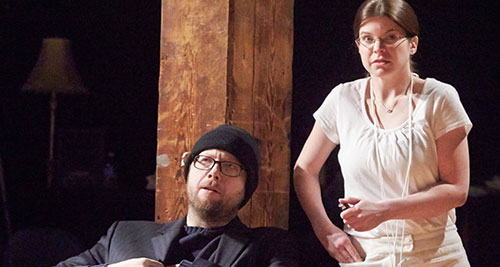By John Quinn

In his curtain speech, Charles Reynolds, artistic director of The Abreact, referred to the company's last production as a "starter course" in Theater of the Absurd. And indeed, Albee's "The Play about the Baby" adheres close enough to theatrical conventions that it seems tame. The theater's second offering of its absurd season, four fragments by master of the genre Samuel Beckett, will have one remarking - like Alice - "curiouser and curiouser!"
Theater of the Absurd is a tough sell. Art is communication, but one must understand the language. It's more than likely the arsonist(s) systematically burning down the Heidelberg Project have closed eyes and ears to what Tyree Guyton is expressing. Similarly, it is easy to miss the nuances of absurdist narrative since its intent is rather subversive. It frustrates intellect, ignores emotion and dives deep to communicate with a far more primal entity, perception. Thus a perceptive audience can return to reality with a new world view.
The four playlets selected for this evening of Samuel Beckett (1906-1989) are drawn from his works of the late '50s to early '80s and performed in an ascending order of abstraction. It's not like Beckett is ever realistic. But director Lance Alan's steps, sense to nonsense, draw the audience into the playwright's themes of isolation and entrapment. The order gives us the ability to absorb a radically different style of theater.
In an otherwise empty world, a blind beggar (Dennis Kleinsmith) and an amputee (Mike McGettigan) in a "wheeled chair" (he tortuously poles himself along with a cane) team up to exchange sight for motility. "Rough for Theatre I" speaks of futility, since neither "cripple" can extend himself far enough to let the partnership work. This piece is remarkable for the raw poetry of the dialogue - even more so since it was originally written in French and translated later by the playwright himself. It's also a striking piece in that it is played by two formidable actors who understand the power of voice.
"Footfalls," first performed in 1976, wraps time in a bubble, doing away with past, present and future. Jaclyn Strez paces a darkened stage; nine steps right, nine steps left. She holds conversation with her bed-ridden mother, played by Linda Rabin Hammell. But is it Mom or is it memory? Even in her brief appearance on stage, Hammell is a ghostly figure and Strez is alone even in her presence. This eerie and provocative piece is another example of Beckett's mastery of language, and the poetry is only enhanced by the vulnerability the artists bring to the characters.
"Catastrophe" finds Kleinsmith as a performer in the hands of a self-centered stage director (McGettigan again) who only acts through an Assistant, Heather Hudson. The play is a tough nut to crack; study Wikipedia and one finds that "Catastrophe" is Beckett's homage to his fellow playwright, Czech dissident Vaclav Havel. Mute and without gesture, Kleinsmith delivers a powerful affirmation of human will in the face of despotism.
"Play," an early '60s piece, is the most "out there" of the evening's offerings. Here Hudson, McGettigan and Strez are confined to giant urns, with only their heads exposed. Similarity to Egyptian canopic jars is not accidental. Husband, wife and mistress, a menage a trois, repetitively recount their empty affairs, only able to speak when their spotlight is on. Their quick reactions, their breathless presentation and their complete disengagement with their stories define an exercise in alienation; after the second iteration of the same story, all amusement is gone. The audience finds the excuses as tawdry as the affair.
The artist who can eloquently speak to a wide audience is a treasure. Beckett, enmeshed in a fatalism that is stereotypically expected of anyone who shares his Irish heritage, is not for everybody. But for the individual who believes he or she will benefit from sharing life's follies with a master playwright, the experience is a logical next step in enlightenment.
REVIEW:
'4 Plays by Beckett'
The Abreact, 1301 W. Lafayette #113, Detroit. 8 p.m. Friday-Saturday through Jan. 11. 90 minutes (with intermission). Pay-what-you-can; reservations suggested. 313-454-1542. http://www.theabreact.com









